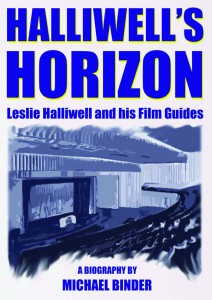Halliwell’s Horizon: Leslie Halliwell and His Film Guides, by Michael Binder (Lulu Press, July 2011), 302 pages. ISBN: 978-1447742050 (hardback) £18.99; ISBN: 978-1447748212 (paperback) £8.99; Kindle e-book: £0.99
 About the Author: Dr Sheldon Hall is a Senior Lecturer in Stage and Screen Studies at Sheffield Hallam University. He is the author of Zulu: With Some Guts Behind It - The Making of the Epic Movie (Sheffield: Tomahawk Press, 2005; reprinted 2006; 2nd edition due in 2014); with Steve Neale, Epics, Spectacles and Blockbusters: a Hollywood History (Wayne State University Press, 2010) and among the articles he has contributed to books and journals is a chapter on Straw Dogs in Seventies British Cinema (ed. Robert Shail, BFI/Palgrave Macmillan, 2008).
About the Author: Dr Sheldon Hall is a Senior Lecturer in Stage and Screen Studies at Sheffield Hallam University. He is the author of Zulu: With Some Guts Behind It - The Making of the Epic Movie (Sheffield: Tomahawk Press, 2005; reprinted 2006; 2nd edition due in 2014); with Steve Neale, Epics, Spectacles and Blockbusters: a Hollywood History (Wayne State University Press, 2010) and among the articles he has contributed to books and journals is a chapter on Straw Dogs in Seventies British Cinema (ed. Robert Shail, BFI/Palgrave Macmillan, 2008).
Self-published through the print-to-order service Lulu Press, Michael Binder’s affectionate biography of Leslie Halliwell surely deserves a more mainstream publisher, befitting its subject. Halliwell’s name is popularly enshrined in the two film reference works he created: Halliwell’s Filmgoer’s Companion, which first appeared in 1965; and Halliwell’s Film Guide, first published in 1977. These are still familiar items on the bookshelves, though recent editions have been edited and regularly updated by John Walker since their founder’s death in 1989. However, Halliwell’s numerous other published works have all now fallen out of print and he is in danger of being remembered only by film buffs of a certain age. He was never highly regarded by the academic establishment, whose own members Halliwell often dismissed as pretentious “eggheads”, and the books themselves have to some extent been eclipsed by competitor volumes and especially by online sources such as the Internet Movie Database. This is now usually the first port of call for anyone wishing to look up the contents of an individual’s filmography or a critical star rating for an obscure movie; but Halliwell was a pioneer in the field and his reference books were, during his lifetime, entirely his own work rather than the product of a team or committee. Uniquely, therefore, they bore his idiosyncratic, somewhat irascible stamp, being permeated with the attitudes of a man dissatisfied with the “excesses” of modern cinema and forever harking back to the “Golden Age” of Hollywood, particularly the 1930s, his formative years.
 Binder himself is of a younger vintage, not yet in his twenties when Halliwell died from cancer at the age of 59. The biographer was drawn to his subject from an early date by their clear affinity for old movies as well as by an envious appreciation of the concise, drily witty (if often glib) style of Halliwell’s potted career summaries and thumbnail evaluations. Binder also maintains a website devoted to Halliwell and his works, (www.lesliehalliwell.com), where he admits: 'whilst I occasionally defect to certain online reference sources for more in-depth information, it is to the Guide I immediately turn after watching a movie, simply to find out what Halliwell thought of it. And whilst I may agree or disagree with the assessment given, it is rare that I don’t at least appreciate his point and wish that I could discuss it with him further, perhaps over a curry supper.' Here Binder surely speaks for several generations of movie buffs weaned on the Guide and the Companion, even if they later moved on to stronger stuff. Irritable and irritating though he could be, Halliwell was his own man, a salt-and-vinegar personality who remained stubbornly engaging precisely for, as Binder points out, the consistency of his often reactionary opinions and prickly prejudices.
Binder himself is of a younger vintage, not yet in his twenties when Halliwell died from cancer at the age of 59. The biographer was drawn to his subject from an early date by their clear affinity for old movies as well as by an envious appreciation of the concise, drily witty (if often glib) style of Halliwell’s potted career summaries and thumbnail evaluations. Binder also maintains a website devoted to Halliwell and his works, (www.lesliehalliwell.com), where he admits: 'whilst I occasionally defect to certain online reference sources for more in-depth information, it is to the Guide I immediately turn after watching a movie, simply to find out what Halliwell thought of it. And whilst I may agree or disagree with the assessment given, it is rare that I don’t at least appreciate his point and wish that I could discuss it with him further, perhaps over a curry supper.' Here Binder surely speaks for several generations of movie buffs weaned on the Guide and the Companion, even if they later moved on to stronger stuff. Irritable and irritating though he could be, Halliwell was his own man, a salt-and-vinegar personality who remained stubbornly engaging precisely for, as Binder points out, the consistency of his often reactionary opinions and prickly prejudices.
Binder is particularly good at assembling impressionistic reconstructions of Halliwell’s experiences from the traces left there and elsewhere
In tracing his life and work, Binder draws extensively on Halliwell’s own publications. Besides the various editions of the two voluminous encyclopaedias, these include an early-years memoir, Seats in All Parts (1985), mainly concerned with Halliwell’s childhood in Bolton and young adulthood in Cambridge. Binder is particularly good at assembling impressionistic reconstructions of Halliwell’s experiences from the traces left there and elsewhere, occasionally taking an imaginative liberty with the record in order to render his account more vivid. Besides his unofficial role as the nation’s film-buff-in-chief Halliwell also served for nearly twenty years as film buyer for the ITV network and latterly for Channel Four. In this capacity he not only acquired but also helped to schedule many of the movies he evoked in print, allowing younger viewers like Binder the opportunity to catch up with countless treasures rarely revived even in repertory cinemas. This aspect of his legacy is chronicled in gratifying detail; indeed, the book takes its title from one such film, Lost Horizon (1937), identified by Halliwell himself as being among his personal favourites, to which he had written an imaginary sequel in the form of a novel, Return to Shangri-La (1987).
Perhaps inevitably given the influence that Halliwell evidently exerted on Binder’s tastes (a common experience, as the present reviewer can also testify) there are passages when this biography is insufficiently critical. In discussing the hostility Halliwell sometimes generated in contemporaries such as Alexander Walker (who declined to write a Who’s Who entry for him) and Philip French (who deplored his narrow cultural purview), Binder tends understandably to side with the target against his attackers. In doing so he often reinforces the many blind spots to which Halliwell confessed and underwrites the anti-intellectualism which he was perhaps less willing to acknowledge. A more detached biographer might have pulled him up more severely on some of his outrageous dismissals and neglectful omissions (notably the marginal treatment of non-Anglophone cinemas in the encyclopaedias), though Binder does identify Halliwell’s weakness for indulging in long lists of film titles which probably meant more to him than to the reader.
Halliwell’s Horizon is a pleasure to read from beginning to end
However, a writer who was not to some degree under Halliwell’s spell would probably not have embarked on such a book at all. Binder’s own prose style is more fluent and elegant than self-publication might lead one to expect, and Halliwell’s Horizon is a pleasure to read from beginning to end. It could certainly benefit from tidying up by an expert copy-editor, but there are fewer mistakes than could have been anticipated. The author’s research has been thorough, and though the source notes could have been more rigorous and some of the secondary sources more scholarly (Binder’s main text for Hollywood history is Barry Norman’s anecdotal Talking Pictures), his pathway is well documented. Most importantly, the book is a worthy, loving tribute to its subject and clarifies his achievements for any user of the Filmgoer’s Companion or Film Guide who happens to wonder what their namesake did to deserve commemoration.
Dr Sheldon Hall
For more information about the book and its subject, visit: www.lesliehalliwell.com